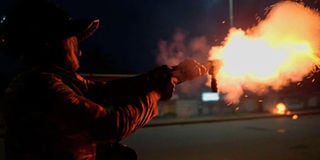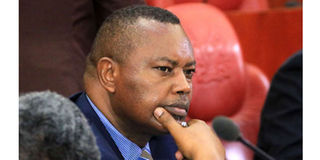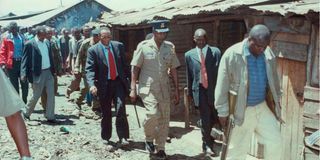Premium
Licensed to kill: Behind police death squads

From the Flying Squad to Kwekwe, their brief is to eliminate suspected criminals and either frustrate or neutralise perceived enemies of the state.
What you need to know:
- The disbanded Special Services Unit of the DCI is just one of many elite squads that have brutalised Kenyans for decades.
- From the Flying Squad to Kwekwe, their brief is to eliminate suspected criminals and either frustrate or neutralise perceived enemies of the state
On January 27, 2005, one of the most notorious gangsters in the country was gunned down in a dawn raid on his hideout in Zimmerman Estate, Nairobi, after a five-hour standoff.
The reign of terror of former policeman Daniel Kiptum Cheruiyot, who had killed two officers, came to an end in a hail of bullets in an operation led by then police boss Maj-Gen Mohammed Hussein Ali and then Director of Criminal Investigations, Joseph Kamau.
Cheruiyot was eliminated by a combined team of officers from the Flying Squad and the Kanga Squad. During the standoff, police lobbed teargas into his house and fired many rounds, but he kept firing back. He engaged officers in a shoot-out before finally walking out with his Israeli-made Uzi sub-machine gun. Big mistake. A sniper shot him in the head.
The Flying Squad was then led by Musa Yego, while Kanga was under George Kinoti, who would later rise to become the DCI director. These are just two of many special police units that have been formed over the years to fight crime, particularly human and narcotics trafficking, theft of transit goods, bank robberies, carjacking and motor vehicle theft.
The operations of these squads were brought into question, however, following claims that they had been involved in extrajudicial killings instead of fighting criminals. When President William Ruto took the reins of power, he ordered the disbandment of the Special Services Unit (SSU) over complaints of its involvement in enforced disappearances.
In the 1990s, whenever a Peugeot 504 station wagon drove into an estate or shopping centre, all men would scatter to safety. Anyone bundled into the boot of the fast-driven vehicles would either end up dead or in prison. Those who experienced the wrath of the officers in those vehicles never lived to tell the story and if they did, were scarred for life.
Brutality
The Flying Squad was known for its brutality; it operated above the law. Junior officers attached to the unit disregarded the Force Standing Orders (FSO), now Service Standing Orders (SSO), bypassing senior officers as they reported directly to the DCI boss.
Other than the Flying Squad and Kanga, other elite squads were Kwekwe, Eagle, Rhino, Kanga, November and Spider. The Flying Squad team was set up by then DCI director Noah arap Too to stop carjacking, bank robberies, muggings and burglaries.
It had the dynamic duo of Chief Inspector Timothy Kamunde and Daniel Seroney. Kamunde regularly introduced himself by his name followed by his title (Timothy Kamunde, Chief Inspector). He would give suspected criminals unmarked police cars to go get their accomplices, which the suspects would do. In his car, Kamunde carried iron bars, machetes, ropes and firearms. It is reported that he preferred to torture suspects and rarely used firearms.

Former Director of Criminal Investigations George Kinoti. The process of finding his replacement is expected to be concluded this week
It is told how one time, while giving evidence in a Nakuru court, Kamunde was challenged by a suspect during cross-examination. While still before the magistrate, Kamunde dared the suspect to repeat the questions outside the court. The suspect refused to leave thereafter and pleaded with the magistrate for protection.
Kamunde was feared even by senior officers to whom he never reported. After his retirement, he was at one time recalled by then President Daniel arap Moi to help stop armed robberies. He was given sweeping powers and was only answerable to the Director of Criminal Investigations. Even officers more senior than he would report to him. When the team was being disbanded, some of the members of the squad were reported to have been found with stolen car engines and were suspected of being accomplices to armed criminals.
To countercheck the rogue Flying Squad, the then DCI director, Francis Sang, set up the Special Crime Prevention Unit (SCPU) in 1999, led by Peter Kavila. The elite unit, comprised of sharp-shooting commandos mostly drawn from the General Service Unit, was tasked with combating armed robberies, human and narcotics trafficking, theft of transit goods and bank robberies. The Flying Squad continued with its operations, though downscaled, under Sammy Githui, Francis Okonya, Sebastian Ndaru, Munga Nyale, Musa Yego and Said Kiprono. Yego, a sharpshooter, held forte at Flying Squad for several years until he was promoted to Provincial Criminal Investigations Officer in North-Eastern Province.
In his memoirs, Sang said that, due to a number of socio-economic factors like poverty and rural-urban migration, incidents of carjacking, bank robberies, muggings and burglaries increased during his tenure.
Kwekwe squad
Then there was the Kwekwe squad, which was formed to neutralise the outlawed Mungiki sect that had been terrorising Kenyans for a long time. Soft-spoken and shy Chief Inspector Zebedio Maina led Kwekwe. Maina, who never looked you direct in the eye, was so brutal that anyone fingered as Mungiki chose to relocate rather than face his wrath. Maina preferred to work alone or with only trusted lieutenants. Following a public outcry, Kwekwe was renamed Eagle and its operations moved to Buru Police Station.
One of Maina’s colleagues, Chief Inspector John Kariuki, died mysteriously a couple of years after he left the service. Kariuki had been among SCPU detectives who were accused of torturing suspects in the murder of University of Nairobi political science Professor Chrispin Odhiambo Mbai in 2003. He returned to the service but fell ill and later retired. He was later found dead in his house while working as a security office for Naivas supermarkets.
After Kavila exited the SCPU, it came under the leadership of Richard Katola, who was credited with cracking down on the infamous string of money heists by G4S Security cash-in-transit teams. The unit made partial recovery of the millions of shillings stolen by the G4S staff and brought a stop to what had become a trend. Katola was involved in the anti-Mungiki operation between 2007 and 2012, during which time the unit was accused of engaging in extrajudicial killings of suspected outlawed gangs. He suffered a stroke that left him bedridden for over three years before he died at the Kenyatta National Hospital (KNH). Maina and another Flying Squad boss, Reche Nyagah, suffered the same fate.

Then Police Commissioner Maj-Gen Mohammed Hussein Ali (centre) and then-DCI boss Joseph Kamau (behind him) lead other officers in the hunt for gangsters who had gunned down two policemen in Lunga Lunga slum, Nairobi, on April 22, 2004.
Several specialised unit members have disappeared. Bernard Kiriinya, a driver of the unit who made a video confession of involvement in extrajudicial killings and was expected to testify, was shot dead by his colleagues-turned-foes in Westlands, Nairobi, in 2010. This was despite the fact that he had been accommodated in a safe house by the Kenya Human Rights Commission, to whom he had handed the confession.
So efficient was the SCPU that sometime in 2010, a Toyota Prado stolen from Nairobi was traced to Taveta and the four detectives who were dispatched to recover it brought back not just the suspect they found with the vehicle, but four others whom they picked up in Mwatate, Voi, Athi River and Mlolongo. It only took a bone-crunching strike from a detective with a soda bottle for the suspect to lead police to his accomplices.
Criminal Intelligence Unit
Then there was the Track Unit which worked in collaboration with the Criminal Intelligence Unit and the SCPU, which became the SSU after Kinoti took over as DCI boss and disbanded the Flying Squad. The Parklands Police Station-based Track Unit, led by the no-nonsense Francis Njiru, was established to supplement the efforts of the SCPU and Criminal Intelligence Unit by following up the cases handled by the two units and preventing loss of evidence gathered. Njiru was not a quiet man and he made such an impact in the criminal justice system that the mention of his name caused shivers among criminals.
He dismantled a number of criminal syndicates in the country and would later be redeployed to DCI Headquarters. The Kanga Squad was involved in many cases, including investigations into the robbery case involving author Ngugi wa Thiong’o and his wife at the Norfolk Apartments in Nairobi. It was disbanded after the removal of Kamau as the DCI boss and the officers redeployed to various police stations.
Upon appointment as DCI director, Kinoti reassembled Kanga and redeployed the officers to DCI Parklands. They reported directly to him and carried out special assignments such as anti-counterfeit operations targeting sugar, rice, cooking oil and tyre imports into the country. The unit had sweeping powers and worked under the Multi-Agency Task Force that included the Kenya Revenue Authority, DCI and Kenya Bureau of Standards.
Earlier this month, the Independent Policing Oversight Authority (IPOA) announced that it had initiated investigations into many complaints of extrajudicial killings by police.
“Pursuant to sections 4,5,6 and 7 of the IPOA Act, IPOA has commenced investigations and audit of the recently disbanded SSU and other units and/or formations within the NPS [National Police Service] to establish the propriety of their operations and the level of professionalism. IPOA is further keenly investigating NPS action and/or inaction following numerous complaints received of enforced disappearances, abductions and murders,” IPOA chairperson Anne Makori said in a statement.
In January, IPOA launched investigations into the incident of 25 bodies found in River Yala. Most of the suspects had criminal cases pending before the court. Amnesty International Kenya director, Irungu Houghton, urged NPS to investigate the disbanded SSU. “The NPS must bring to justice anyone responsible for enforced disappearances and extrajudicial killings of many,” said Houghton.




